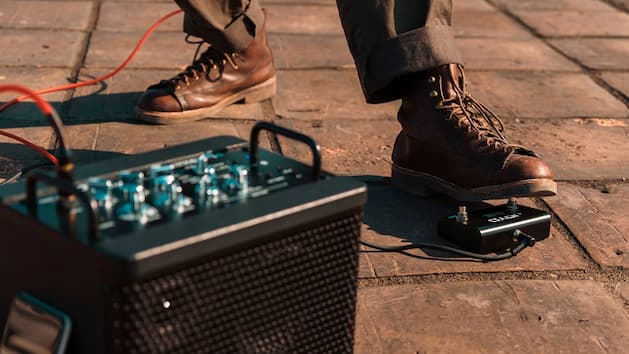Whether you’re just starting out or have been playing for years, having the right equipment can make a huge difference in your sound and music experience overall. From instruments to studio gear, cables to microphones, there’s a lot to consider. You should have the essentials no matter if you’re a beginner or an experienced musician.
Instruments

Every musician’s setup core is the same: their instruments. Choosing the proper ones depends on your experience, playing style and your budget. It’s very important to choose an instrument that inspires you, whether it’s a keyboard, a guitar, a brass instrument, a drum kit or something more niche. The right, high-quality music equipment can make a big difference.
If you’re a beginner, starting with an entry-level instrument is a good idea. There are reputable brands that offer budget-friendly options that won’t sacrifice quality. This means you can develop your skills without frustration. Beginner guitars for example, often have thinner necks. This way you can practice finger placement and make it easier to play.
If you’re a more advanced musician, investing in a higher-end instrument can improve your tone and playability. Plus, it’ll give you more room to express your style. Customisation options, better woods, and improved hardware can make a noticeable difference, especially in recording or performance settings.
Never underestimate used instruments as well. By finding the right seller and carefully shopping, you can stumble upon some well-maintained instruments for a good price. Just make sure to try before you buy and check for any damage or wear that could affect sound or durability. Check your local music shops. They sometimes offer great deals on used instruments, and you can get expert advice.
Microphones
The market is filled with various microphone options. They come in many shapes and sizes, and sometimes choosing the right one can be difficult. The main question is will you be recording or amplifying? If you’re looking for a mic to use in live performances or with loud instruments such as drums and guitar amps, you should invest in dynamic mics.
They’re made to handle high volumes very well. Plus, they’re less sensitive to background noise. You can also find condenser microphones that are more sensitive. They’re able to catch more detailed sounds and are great for acoustic instruments and studio vocals. They deliver a more nuanced, clearer sound.
Ribbon microphones are also an option, but they’re not as popular. However, they’re cherished because of their warm and natural tone. They’re often used for string instruments and vocals.
If you’re recording at home, a quality condenser mic is often a good place to start. For live gigs, a rugged dynamic mic will usually do the job. Don’t forget to consider accessories like pop filters to reduce plosive sounds, shock mounts to minimise vibrations, and windshields if you’re recording outdoors.
Cables and Connectivity

Even though they’re not the most expensive gear, cables are very important. They’re the essentials when it comes to connectivity. Choosing low-quality products can negatively influence the sounds. They can introduce noise, dropouts and, in some cases, even damage the rest of your equipment.
There are several types of cables you’ll come across in music setups. For microphones, musicians usually use XLR cables. On the other hand, for keyboards and guitars, musicians use ¼-inch or TSR instrument cables. If you have some pedals or studio gear to link, patch cables will come in handy.
Make sure the cable is the right length for your music equipment, and go for ones with solid connectors, like gold-plated tips or reinforced jackets. Keeping things tidy with cable ties or organisers not only looks better but also helps prevent tangles and wear. Well-maintained cables can save you a lot of hassle during gigs or recording sessions.
Studio Gear
It doesn’t matter if you’re producing professional tracks or recording demos, the right type of studio gear can help you achieve what you want. The heart of every setup is the hub. This is the thing that connects your instruments and mics to the computer. Before buying it from a reputable music equipment shop, make sure you know how many inputs you need and what the quality of the preamps is so you can get a clean signal.
Having a mixer will make it easier for you to control the effects and levels in real time. This is a piece of gear that’s practical in the studio and at live performances. If you’re a beginner, you may want to invest in a mixer that has preinstalled EQ and effects. It’ll be much easier to work with.
No setup is complete without a good pair of headphones and studio monitors. If you want to pick up all the fine details in the sounds, choose high-quality headphones. For a more honest and clearer picture of your mix, good monitors are a must. It’s better if you invest in the ones that have a flat frequency response so you’re hearing the music as it really is. There won’t be any added colouring.
Accessories
The accessories shouldn’t be an afterthought because they can make a big difference in your setup. Mic and instrument stands help keep things organised and lower the risk of anything getting knocked over. A solid mic stand with adjustable height and a boom arm can really make recording or performing more comfortable.
Pop filters will help you smooth out harsh vocal sounds. If you’re a guitar player, you’ll need a pedalboard to keep your effects tidy. A reliable tuner is a must because it will help your instrument show the best sound possible. Carrying cases and gig bags protects your gear when you’re on the move, and a good strap makes long sessions easier on your back and shoulders.
How to Maintain the Gear
Maintaining your gear properly will ensure it lasts for a very long time. Clean it regularly, remove dust, sweat and grime because all of these things can damage the equipment. Keeping your accessories, gear and instruments in proper cases will protect them from knocks, bumps, temperature changes and humidity. Always check your gear, especially the cables for damage. Investing in good maintenance will save you money in the long run.


